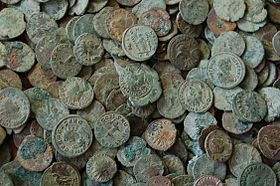Hoard of Frome
The Frome Hoard , a hoard find of around 52,500 Roman coins from the second half of the 3rd century AD, was found in 2010 with a metal detector in a field near the town of Frome in Somerset , England . The coins were in a pot filled to the brim. In 1867, 111 coins had already been found in the field, and 62 scattered immediately before the discovery. The rescue by summoned archaeologists took three days. The find is one of the largest ever made in the UK. Its value was estimated at £ 320,250.
Over 760 of the coins belong to Marcus Aurelius Mausaeus Carausius († 293), a former general in the Roman army, counter-emperor to Maximian and Diocletian , whose seven-year rule over England and parts of northern Gaul was largely forgotten because he was relieved of his quaestor Allectus or was murdered on whose behalf. The entire treasure includes silver and bronze coins from 21 emperors and three imperial wives. The 67 different coins date from AD 253 to 293, so the treasure was probably deposited shortly before the end of the 3rd century. The hoard was probably a communal votive offering to the gods.
The discovery of the coins follows in the same year as the discovery of a treasure trove of Anglo-Saxon coins in Central England. This so-called Staffordshire Treasure contains more than 1,500 objects, mostly made of gold.
See also
literature
- Sam Moorhead, Anna Booth, Roger Bland: The Frome Hoard . British Museum Press, London 2010, ISBN 978-0-7141-2334-9 .
Web links
- My crock of gold: Chef discovers largest ever hoard of Roman coins in a field. In: dailymail.co.uk. July 9, 2010, accessed October 4, 2019 .


